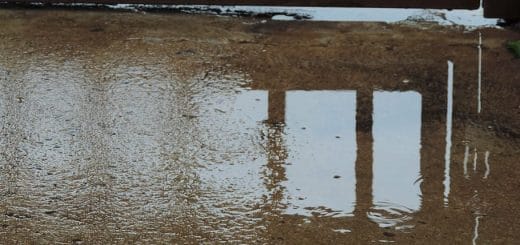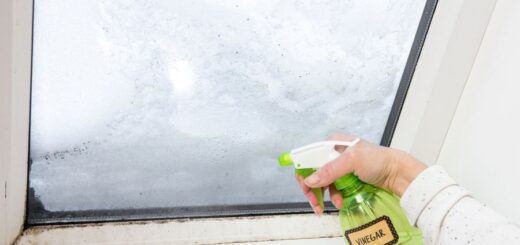Keep your Important Documents Protected from Disasters with These Tips
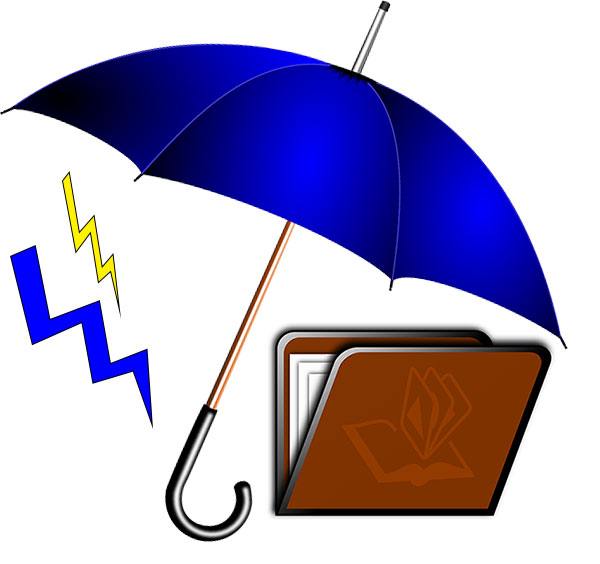
Having your important documents safe and intact will help you get back on your feet quickly and easily after a disaster.
Unfortunately, different accidents and natural disasters can reduce your home and all your earthly possessions to dust and rubble in a matter of minutes. And while it is quite a disheartening experience to see your entire life turning into ruins before your eyes, as long as you (and your family) are safe and sound, getting back on your feet is just a matter of perseverance and time. Of course, the better prepared you are for such an unfortunate event, the easier it will be to rebuild your life after the disaster.
There are a number of efficient precautionary measures you can take to protect your family, your property, your identity, and your assets in the event of a disaster. Ensuring the safety of your paperwork is certainly among the most important of them all – if you have all the required documents, you can easily establish your identity, file an insurance claim, and recover or replace most of your material possessions.
However, gathering and/or restoring all your important papers in the aftermath of an emergency can be very difficult and time-consuming. Things will be much easier if you manage to keep your documents safe and protected from disasters.
What Documents to Protect During a Disaster
The list of important documents that need to be protected from disasters is quite long, but having these essential papers intact and within easy access will save you a lot of trouble down the road.
Personal Documents
To be able to go on with your life and initiate any disaster recovery actions, you need to establish your identity first. The documents required to identify yourself and your family members include birth certificates, passports, driver’s licenses, social security cards, marriage certificates, diplomas, professional licenses, skills qualifications, military documents, citizenship papers, child custody agreements, adoption papers, etc. Having your personal ID papers will not only allow you to easily deal with different institutions and organizations, but will also considerably speed up the coordination work with insurance companies, restorationRestoration is the process of returning a property to its pr... More professionals, bankers and other entities involved in the restorationRestoration is the process of returning a property to its pr... More process.
Property Records
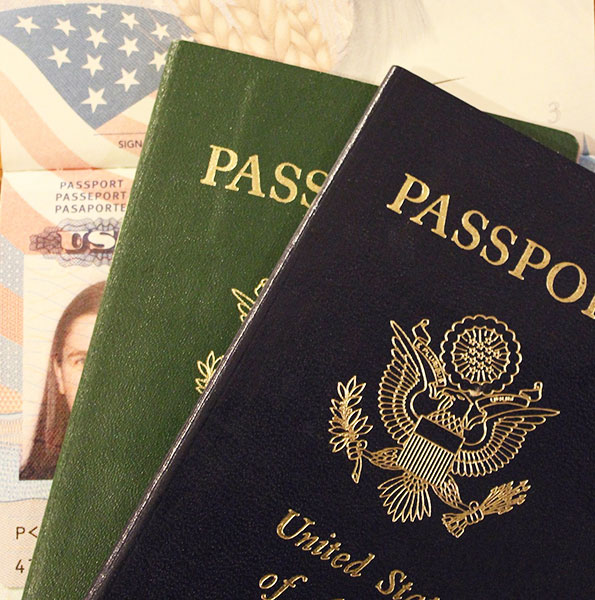
Make sure you have all the paperwork required to establish your identity, initiate a claims process, and begin the restorationRestoration is the process of returning a property to its pr... More process as soon as possible after an emergency.
It is essential that you keep your property related documents safe from a disaster. Real estate deeds of trust and mortgage documents, rental agreements and lease copies, registration documents of motor vehicles and other property records will be required in order to file an insurance claim and begin the restoration process.
Have in mind that any proof of ownership you can provide (a home inventory list, titles, warranties, maintenanceMaintenance is the routine care, inspection, and repair of a... More records, etc.) will come very handy for insurance purposes, so it’s highly recommendable to protect all the relevant paperwork. If you have any valuable pieces of art or other very expensive items in your home, make sure you keep their corresponding authenticity certificates safe and intact as well – you will need them to prove the genuineness of your precious possessions.
Financial and Legal Documents
Losing your financial and legal documents will most certainly result in a lot of problems and plenty of wasted time, so you are strongly advised to ensure the best possible protection for your financial records in case of a disaster. These important papers include credit cards, bank statements, loan papers, brokerage and retirement account information, tax records, and any stock and bond certificates you may have.
Needless to say, it is your insurance policies (homeowners, renters, flood, earthquake, auto, life, health, disability, long-term care, etc.) that will be of paramount importance in the aftermath of an emergency. Even if you lose the insurance papers in a disaster, you will still be able to initiate a claims process as long as you have the policy number and the insurance company contact information for each type of coverage.
Medical Records
You need easy access to your medical documents at any time, of course, and especially in an emergency situation. Therefore, you’d better make every effort to protect your and your family members’ health insurance cards, immunization records, disability documents, prescriptions, and any other relevant medical records from a disaster. They will be very useful if you happen to need medical assistance in the post-disaster period.
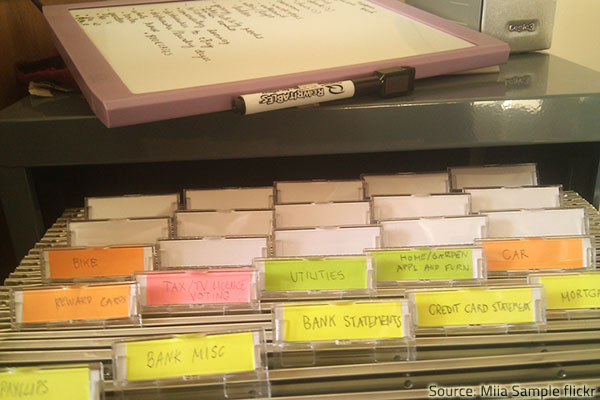
Sort through all your essential documents and take every precaution to ensure their safety in the event of a disaster.
Last but not least – prepare a list of important phone numbers (emergency numbers, medical facilities, your insurance company, your family physician, friends and relatives, etc.) and keep it with you all the time. Remember that you need to have all these phone numbers written on paper as your phone may run out of battery or get damaged during the disaster.
How to Keep Your Documents Safe from Disasters
To ensure your peace of mind, as well as a quick and trouble-free disaster recovery, you need to have your paperwork properly organized and safely stored. Pay special attention to your most important documents and the ones that will be particularly difficult to replace if lost or damaged.
Make an Inventory of Your Documents
A detailed inventory will help you easily organize your documents and keep them in order. You will be able to find any specific document you need quickly and with minimum effort:
- Get a three-ring binder and several binder pockets or plastic sleeves. The plastic pockets will not only allow you to better systematize your papers but will also provide some protection against moisture, dust, and dirt;
- Use color-coded tabs to create individual sections within the binder;
- Sort out your papers by subject and put them in separate pockets or sleeves. Make sure every pocket goes into its corresponding section.
This way, you will have a fair chance to salvage your important documents in the event of a disaster – when they are properly organized and stored in one place, it will be easy to take the binder with you when evacuating your home.
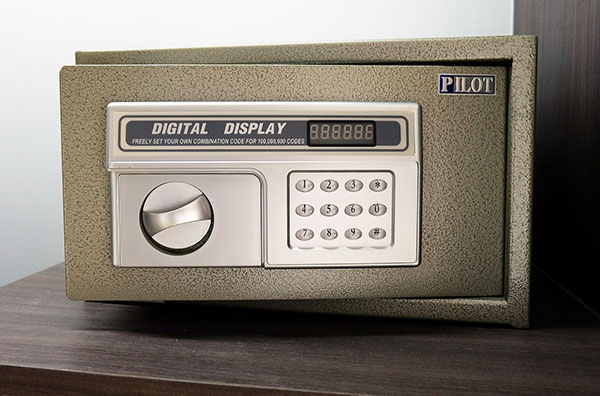
A portable fireproof safe will provide the best possible protection for your papers.
Store Your Documents in a Safe
To protect your documents from fire and water you are strongly recommended to keep your moving binder in a fire and waterproof safe. This will help you prevent both water damage and fire or smoke damage to your essential paperwork. A locking filing cabinet or portable lockbox will also provide suitable storage but won’t ensure as good protection as a fireproof safe or a watertight container. When it comes to convenience, however, a portable storage container is certainly the better option – you can simply grab it on your way out if you need to evacuate your home during a disaster.
Whatever you choose, make sure you store your documents in a convenient place – safe and easy to access (if it is a portable box, don’t forget to put it back in exactly the same spot every time, so that you can find it quickly in a state of emergency).
Make Copies of Your Important Documents
Having duplicate copies of your most important papers is a must – not only can it be convenient in many different situations, but you will also have backup in case the original documents get lost, damaged, or destroyed.
- Make paper copies or duplicates of your key documents and store them in a different place than the one where you keep the originals (consider a safe deposit box at a bank);
- Make digital copies of all your documents – it is easy and will come in very handy if anything happens to the originals or the hard copies of your documents. Scan your papers and save them both onto your computer and on a portable storage device – an external hard drive or flash drive. Don’t forget to email the scanned copies to yourself and to store them in the cloud as well. In case all your electronic devices get damaged in the disaster, you will still be able to get access to the digital copies of your documents. Just make sure you remember the password to your storage account!
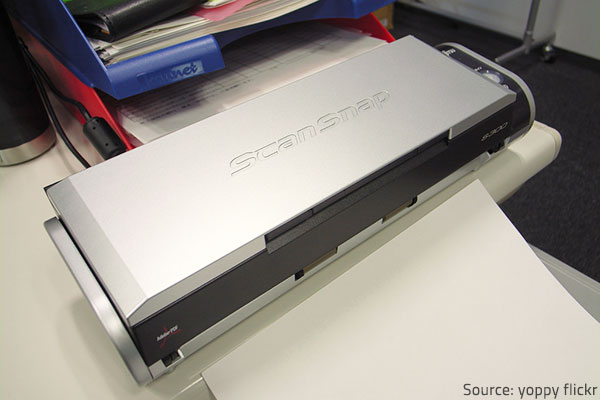
Make both paper copies and electronic copies of your documents to have a reliable backup in case the originals get damaged.
One final piece of advice – do your best to prevent identity theft during a disaster. Make sure no one has access to your documents or your digital data, as you may get into a lot of trouble and lose plenty of time and money if identity thieves get hold of sensitive personal information (passwords, credit card numbers, etc.).
Keeping your important documents protected from disasters will be worth your time and effort – you will not only be able to ensure a quick and beneficial claims process, but won’t have to go through all the formalities for getting new documents (a troublesome, time-consuming and expensive process) either.










